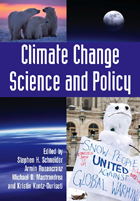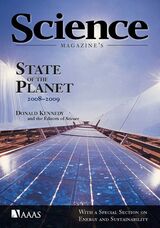2 books by Mastrandrea, Michael D.

Climate Change Science and Policy
Stephen H. Schneider, Armin Rosencranz, Michael D. Mastrandrea, and Kristin Kuntz-Duriseti
Island Press, 2009
This is the most comprehensive and current reference resource on climate change available today. It features 49 individual chapters by some of the world’ s leading climate scientists. Its five sections address climate change in five dimensions: ecological impacts; policy analysis; international considerations; United States considerations; and mitigation options to reduce carbon emissions.
In many ways, this volume supersedes the Fourth Assessment Report of the Intergovernmental Panel on Climate Change (IPCC). Many important developments too recent to be treated by the 2007 IPCC documents are covered here. This book considers not only the IPCC report, but also results of the UN Framework Convention on Climate Change held in Bali in December 2007, as well as even more recent research data. Overall, Climate Change Science and Policy paints a direr picture of the effects of climate change than do the IPCC reports. It reveals that climate change has progressed faster than the IPCC reports anticipated and that the outlook for the future is bleaker than the IPCC reported.
In his prologue, John P. Holdren writes that the widely-used term “ global warming” is a misnomer. He suggests that a more accurate label would be “ global climatic disruption.” This volume, he states, will equip readers with all they need to know to rebut the misrepresentations being propagated by “ climate-change skeptics.” No one, he writes, will be a skeptic after reading this book.
In many ways, this volume supersedes the Fourth Assessment Report of the Intergovernmental Panel on Climate Change (IPCC). Many important developments too recent to be treated by the 2007 IPCC documents are covered here. This book considers not only the IPCC report, but also results of the UN Framework Convention on Climate Change held in Bali in December 2007, as well as even more recent research data. Overall, Climate Change Science and Policy paints a direr picture of the effects of climate change than do the IPCC reports. It reveals that climate change has progressed faster than the IPCC reports anticipated and that the outlook for the future is bleaker than the IPCC reported.
In his prologue, John P. Holdren writes that the widely-used term “ global warming” is a misnomer. He suggests that a more accurate label would be “ global climatic disruption.” This volume, he states, will equip readers with all they need to know to rebut the misrepresentations being propagated by “ climate-change skeptics.” No one, he writes, will be a skeptic after reading this book.
[more]

Science Magazine's State of the Planet 2008-2009
with a Special Section on Energy and Sustainability
Edited by Donald Kennedy and the Editors of Science
Island Press, 2009
Taken from the pages of Science and supplemented by contributions from the magazine’s editors, State of the Planet 2008-2009 offers contemporary science writing that is sometimes provocative, frequently enlightening, and always authoritative. Published by the American Association for the Advancement of Science (AAAS), Science is one of the most respected scientific magazines in the world. With a readership of more than one million people, it offers “hard science” from top scientists to both educated lay readers and scientists alike. The articles collected here are arranged thematically and each section is introduced by a prominent scientist or science writer. Donald Kennedy, who was Editor-in-Chief of Science when these articles appeared in the magazine, contributes a preface and several short essays. Focusing on issues of energy and sustainability, sections of the volume are devoted to the prospects of energy-sparing technologies and alternatives to fossil fuel use, including ethanol and cellulosic digestion. Other sections center on climate change, led by a comprehensive essay on the state of scientific knowledge today and followed by contributions about the Antarctic and Greenland ice sheets, as well as the effects of climate change that have been measured to date, including changes in migration and breeding cycles of birds and flowering in plants, changing patterns of hurricanes and extreme weather events, and alterations in forest fire frequency. Interspersed throughout the book are Science news pieces that highlight particular issues and cases relevant to the main scientific findings. A glossary of key terms and concepts helps students and nonspecialists better understand the terminology and the issues.
[more]
READERS
Browse our collection.
PUBLISHERS
See BiblioVault's publisher services.
STUDENT SERVICES
Files for college accessibility offices.
UChicago Accessibility Resources
home | accessibility | search | about | contact us
BiblioVault ® 2001 - 2024
The University of Chicago Press









